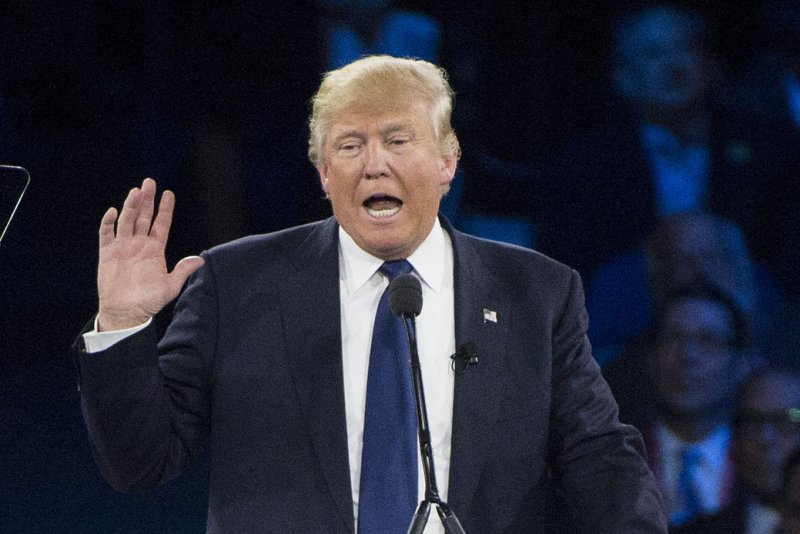Republican presidential candidate Donald Trump delivers a speech in Washington. An in-depth look at the delegate math in the primary shows he may well need to win more than 60 percent of the remaining delegates to capture the nomination, a pace he has not maintained so far. Photo by Kevin Dietsch/UPI |
License Photo
WASHINGTON, April 6 (UPI) -- After Texas Sen. Ted Cruz swept all but six of Wisconsin's 42 delegates over Republican presidential front-runner Donald Trump in Tuesday's primary, the possibility of a brokered GOP convention has become considerably more realistic.
With the about three-fifths of the race complete, there are 882 pledged delegates remaining to be won in the Republican presidential primary. Trump has won 743 delegates, equal to 46 percent of those awarded so far. In order to avoid a brokered convention, Trump must win at least 494 delegates in the remaining contests.
That equals about 56 percent of the remaining delegates, meaning Trump must pick up the pace down the home stretch if he wants to lock up the nomination before the convention.
Cruz has little mathematical chance of passing Trump or reaching the 1,237 delegates needed to win, but if he wants to make a play at a brokered convention, he only needs to win about 400 of the remaining delegates to deny Trump his golden ticket.
If Cruz wins 400 delegates, just 45 percent of those still remaining, Trump would fall just shy of his 1,237 and would not be assured of winning the nomination.
There are other X-factors, as well. The Republican Party will send 106 unpledged superdelegates to its convention, about 4 percent of the total. Those superdelegates are permitted to vote for anyone.
If Trump were to arrive in Cleveland with something just shy of the 1,237 majority, he would still have a powerful argument to party leaders that he deserves the nomination anyway, despite lacking the majority. There is little indication the GOP superdelegate class -- a group that basically embodies the Republican party establishment -- is warming to Trump. Just one such delegate so far has publicly endorsed Trump.
Nine superdelegates have endorsed Cruz so far, and he has become the party establishment's last vehicle in its quest to stop the insurgent Trump from capturing the nomination.
If one assumes Cruz would evenly split the superdelegates with Trump — which, given the present ratio is literally 9-to-1, is probably far too optimistic for Trump — Cruz's stop-Trump number falls below 40 percent.
Put simply: If Donald Trump wants to clinch the Republican nomination, he may well need to win more than 60 percent of the remaining delegates, a pace he has not seemed capable of maintaining so far.















